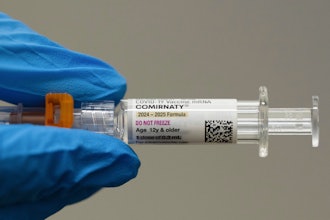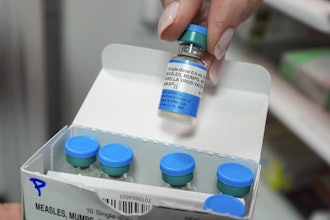
Parents anxious to finally vaccinate their youngest children against COVID-19, strap in: A lot is set to happen over the next week.
On Wednesday, both Moderna and Pfizer will have to convince what’s essentially a science court -- advisers to the Food and Drug Administration -- that their shots work well in babies, toddlers and preschoolers.
Kids under 5 are the only group not yet eligible for COVID-19 vaccination in the U.S. If the agency's advisers endorse one or both shots for them -- and the FDA agrees -- there’s still another hurdle. The Centers for Disease Control and Prevention must recommend whether all tots need immunization or just those at high risk from the virus.
Adding to the complexity, each company is offering different dose sizes and number of shots. And the week won’t even start with the littlest kid debate: Moderna first will ask FDA’s advisers to support its vaccine for older children.
Only a handful of countries, including China and Cuba, have offered different types of COVID-19 vaccinations to children younger than 5.
Here’s a primer to help keep all the developments straight.
PFIZER’S PLAN FOR THE LITTLEST
Pfizer has a pediatric track record -- its COVID-19 vaccine is the only type the FDA allows for children of any age. Two doses plus a booster are cleared for everyone 5 and older. Shots for the 5- to 11-year-olds contain a third of the dose given to teens and adults.
For kids younger than 5, Pfizer and its partner BioNTech lowered the dose even more, to a tenth of the adult dose. The trade-off is a need for three shots, the first two given three weeks apart and the last at least two months later.
MODERNA’S PLAN FOR THE LITTLEST
Moderna is seeking FDA clearance for two shots, each a quarter of its adult dose, given about four weeks apart for kids younger than 6. (Moderna tested slightly different age groups than Pfizer.)
The FDA currently allows Moderna’s vaccine to be used only in adults. But some countries allow full-size doses for teens and half-size shots for kids ages 6 to 11.
MAKING THEIR CASE
Pfizer disappointed parents back in December when a study found two shots weren’t quite strong enough. So researchers tested a third shot in youngsters age 6 months through 4 years during the winter surge of the omicron variant.
Pfizer’s preliminary data showed after three shots, children developed high levels of virus-fighting antibodies with no safety problems. In addition, the vaccine appeared 80% effective in preventing symptomatic COVID-19. But that calculation was based on just 10 cases diagnosed among study participants by the end of April, and it could change if more cases have occurred since.
Moderna’s study found tots ages 6 months through 5 years developed high antibody levels after two of its shots. But while there were no severe cases of COVID-19 during the trial, the vaccine was only about 40% to 50% effective at preventing milder infections. Moderna has begun testing a booster for tots.
WHEN COULD SHOTS START?
If the FDA authorizes one or both shots — a decision expected shortly after its advisory panel's meeting — all eyes move to the CDC. That agency recommends how to use vaccines. Which tots should get COVID-19 vaccination will be an important debate as the coronavirus doesn't tend to make children as sick as adults yet nearly 500 deaths in U.S. children under 5 have been reported.
The CDC’s own vaccine advisers are scheduled to meet next Friday and Saturday, and a final decision by the CDC's director, Dr. Rochelle Walensky, is expected shortly after they're done.
If all those steps fall into place, vaccinations are expected to begin in most areas June 21.
VACCINATION SITES
Pediatricians, other primary care physicians and children's hospitals are expected to vaccinate most of the youngest kids. Limited drugstores are expected to offer them for the littlest kids — parents should check local availability. The Biden administration says it also is working with a variety of other groups, such as children's museums, to offer pop-up clinics and reach even more youngsters.
WHAT IF MY CHILD RECENTLY HAD COVID-19?
About three-quarters of children of all ages are estimated to have been infected at some point during the pandemic. It’s a question sure to come up as CDC’s advisers make recommendations for the littlest kids, so stay tuned.
For older ages, the CDC has recommended vaccination anyway to lower the chances of reinfection. There’s no firm guidance on how long to wait; the CDC has said people may wait three months after an infection.
DEMAND IS UNCLEAR
There are roughly 18 million children younger than 5, and many parents are eager to get their tots vaccinated. But it’s unclear how many ultimately will, given disappointing vaccine uptake by older children.
According to the CDC, just 29% of kids ages 5 to 11 have gotten two doses, and about 60% of 12- to 17-year-olds.
WHAT ABOUT MODERNA AND OLDER KIDS?
On Tuesday, the FDA’s advisers will consider whether to clear Moderna shots for older kids, those 6 to 17 -- a decision that might alleviate some parent confusion.
The agency has held up the teen vaccine for months while it investigated a rare side effect, heart inflammation. That’s mostly a risk for teen boys and young men, and also can occur with the Pfizer vaccine.






















